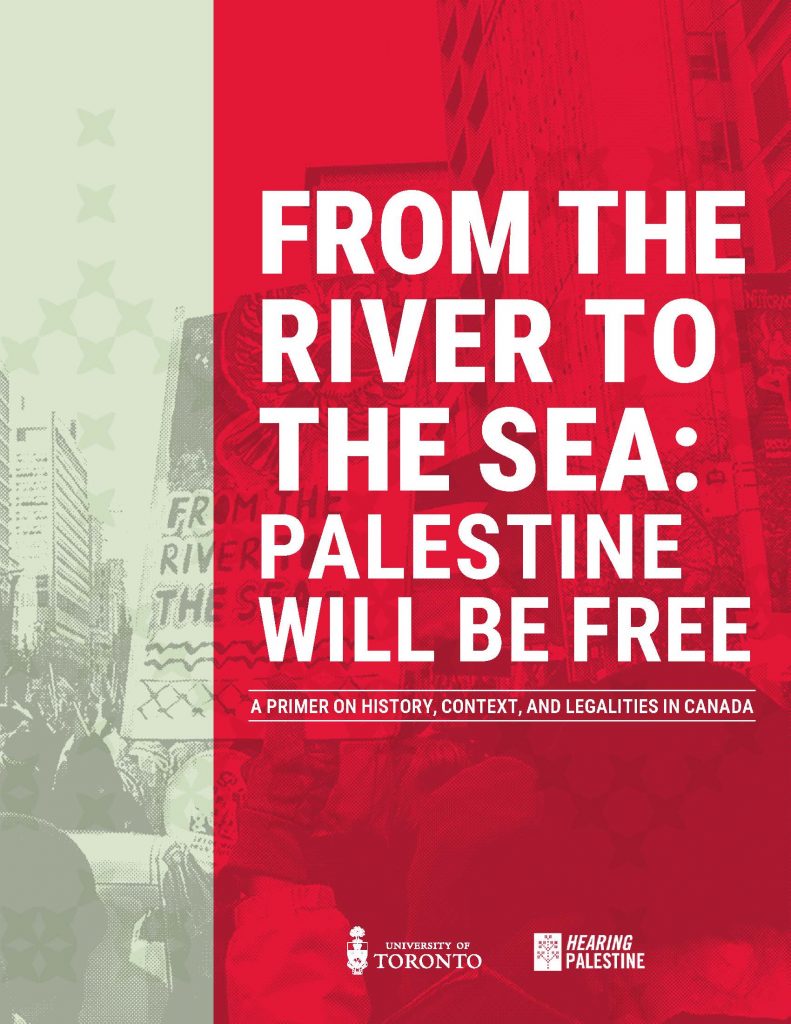Hearing Palestine Initiative, University of Toronto, December 18, 2023
Since the Hamas attacks on Israel on October 7, 2023, and the subsequent Israeli bombardment of Gaza, protests across Canada and around the world have reverberated with a slogan that is now the subject of debate: “From the River to the Sea, Palestine will be free.” Some contend this slogan is a statement of hate and ethnic cleansing against Israel’s Jewish population. Yet the scholars who have looked most carefully show that the history and present use of the slogan is rooted in Palestinian expressions for liberation, freedom, and equality and in the struggle to challenge the on-going context of colonization and military occupation. Furthermore, in a country like Canada, this colonial context is too often misinterpreted by government offices as stemming from a religious conflict. The use of the slogan challenges these dominant misinterpretations which are found across Canadian institutions, and where anti-Palestinian racism is widespread. The Primer explains why it is necessary to frame the meaning and use of the slogan first and foremost within Palestinian history, while addressing the Canadian context in which it is used.
Despite what experts of Palestinian history say about the slogan’s meaning and present use in protest culture, various liberal democratic states around the world, including Canada, are debating whether this slogan constitutes hate under prevailing legislation. In Canada, the Criminal Code prohibits hate speech under s. 319. Moreover, it makes hate promotion an aggravating circumstance for sentencing an offender of a separate underlying criminal act (s. 718).
To address these debates in Canada, Hearing Palestine convened a team of historians, anthropologists, and law professors to create this Primer on the history, context, and legalities of the 10-word slogan. The Primer’s primary audience is the police, hate crimes units, prosecutors, and policy makers who are daily contending with increased calls to ramp up hate speech protections. Moreover, in light of recent political developments in the US and Canada directed at universities, this Primer supports academic administrators charged with preserving academic freedom against efforts that may (inadvertently) chill academic freedom.
While the report provides a robust analysis of the 10-word slogan’s history and use in the Canadian context, two key findings are important to emphasize:
- For Palestinian movements, the slogan is not primarily a political program (e.g., two-state solution, one-state solution, confederation, etc.), but rather a Palestinian expression for liberation, freedom, and equality given the on-going context of colonization and military occupation.
- The robust history of the phrase and the slogan suggests that these 10 words cannot be understood as inherently hateful or hate-promoting under the Canadian Criminal Code
There is no doubt that for some Jewish Canadians, hearing that slogan can have a painful impact on their sense of wellbeing. They may consider the slogan to impact them harshly, as a call for the elimination of Israel and Israel’s Jewish population. It is also true that there are differences of opinion among Jewish Canadians about the meaning of the slogan.
The impact the slogan evokes is certainly part of the evidentiary record on harm and hateful content. But it is not the only evidence of what this 10-word slogan means. The historical record of the regional conflict, and the historical record of how that regional conflict is received in Canada, do not permit framing the slogan within Canadian jurisprudence on hate speech, which overwhelmingly emphasizes intent. The analysis of intent requires careful research about the meaning and use of the slogan within Palestinian liberation movements, both past and present.
The history of this slogan demonstrates that while there is a case to be made that some global actors may use it with an eliminationist meaning, it is generally understood in Canada to be a call for recognition and change, justice and freedom. The slogan is used in a number of different contexts and can have multiple meanings in terms of what kind of future is envisioned in Israel and Palestine. Scholars with expertise in the subject conclude that the slogan is a call for an end to the structures of violence that have impacted Palestinian life for decades. Moreover, for all writers examined, the meaning of the slogan is recognized to depend on the speaker and context.
Given the complex history and recorded use of the 10-word slogan, chants of “from the River to the Sea, Palestine will be free” cannot be considered to ‘target an identifiable group’, a prerequisite to laying charges under the hate speech provisions outlined in s.319(1) or (2); nor can these calls be considered to ‘downplay’ the Holocaust pursuant to s.319(2.1) of the Code. Because the slogan has no essential or inherent meaning, its use cannot perforce constitute ‘hate’, ‘bias’, or ‘prejudice’ towards an identifiable group and therefore cannot animate s.718.2(a)(1).
It is clear that a criminal law response in terms of charging those chanting “from the River to the Sea, Palestine will be free” with hate speech or hate motivated offences under the Code is or would be a gross overreach of the criminal law and one which erodes the Charter protected fundamental right to freedom of speech.
